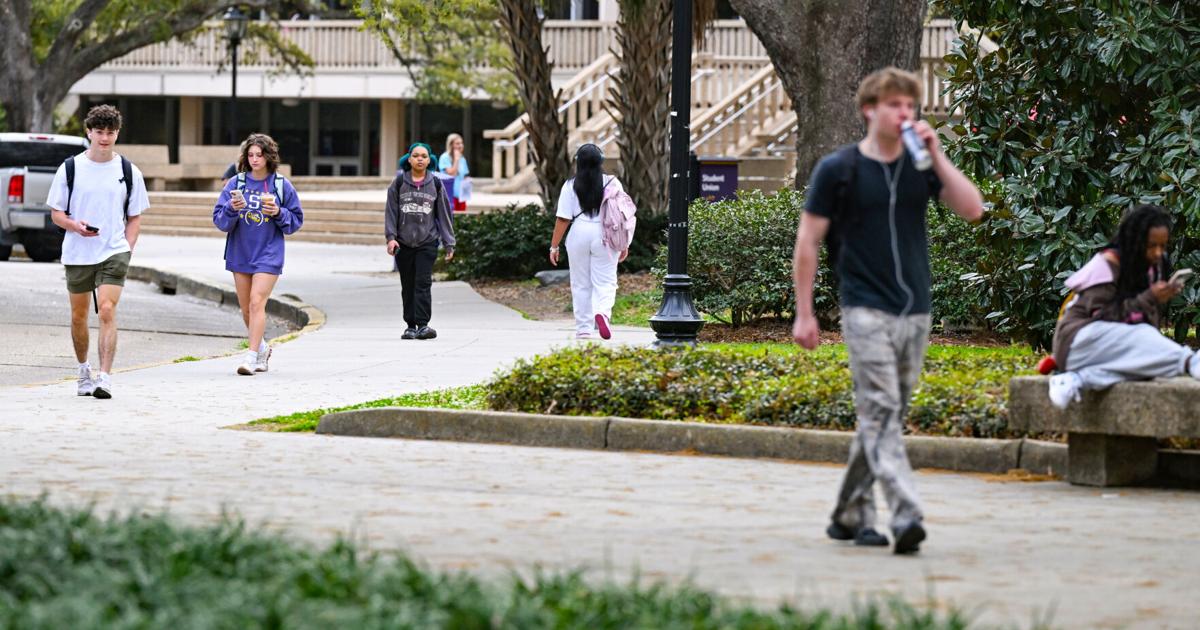
A bill moving through the Louisiana Legislature would set new TOPS scholarship amounts that are higher than what most college students currently get — except at LSU, where some students would get smaller awards than they do now.
A bill moving through the Louisiana Legislature would set new TOPS scholarship amounts that are higher than what most college students currently get — except at LSU, where some students would get smaller awards than they do now.
Louisiana college students would get bigger state-funded TOPS scholarships under a new bill proposed this legislative session — with one major exception.
House Bill 77, which advanced out of the education committee Wednesday, would overhaul the scholarship amounts that students get from TOPS, Louisiana’s program for high-achieving students who attend any of the state’s public colleges and universities.
It aims to bring scholarship amounts more in line with rising college costs and standardize rates across schools, said the bill’s co-authors, Rep. Laurie Schlegel, R-Metairie, and Rep. Christopher Turner, R-Ruston.
But it’ll cost the state an extra $47.5 million, according to estimates, and lower the amount awarded to some students at LSU’s Baton Rouge campus.
The bill would create a new $12,000 annual “Excellence” award for the highest-scoring students and set new standard amounts for the other TOPS awards, which currently vary based on each school’s tuition.
The new amounts — $6,000 per year for the Opportunity award, $6,500 for Performance and $9,000 for Honors — are higher than what students at most schools currently receive. The updated rates would get closer to covering the full cost of tuition and fees, which range from $4,200 annually at most community colleges to about $9,500 at the University of New Orleans and $11,300 at University of Louisiana at Lafayette, according to state data.
The amount for TOPS Tech, a separate scholarship that pays for two years of vocational training, would also increase. It would go up to $3,500 — about $1,000 higher than the current average.
The bill would give a big boost to “students who only receive TOPS and no other academic scholarships to help fund the hefty burden of college,” Walker Pearson, student body president at Louisiana Tech University, told lawmakers Wednesday.
But there is a big catch: The proposed Opportunity and Performance amounts are several hundred dollars lower than the existing rate at LSU’s flagship campus in Baton Rouge, which has by far the most TOPS recipients of any state school. Nearly 9,300 students at that campus received one of those awards this school year, according to state data.
If the bill passes, those students would get smaller scholarships and pay more out of pocket. To soften the blow, lawmakers amended the bill Wednesday to include an additional $700 annual stipend for TOPS recipients at LSU’s Baton Rouge campus and its Health Sciences Center in New Orleans, which also would see a drop in award rates.
“I do believe they appreciated my amendment,” Schlegel said.
An LSU spokesperson did not respond to a request for comment on the bill.
Even with the stipends, LSU students at those two campuses would get about $760 less for Opportunity awards and $660 less for Performance under the proposed rates. By contrast, award amounts would increase by more than $1,400 for Honors recipients, who must score 27 or better on the ACT and earn a 3.5 GPA or higher in high school to qualify.
While some LSU students would take a hit, about 70% of students statewide who receive Opportunity or Performance awards and all Honors recipients would get more money under the proposed rates, Schlegel said.
The legislation is meant to bring the scholarship amounts, which have been frozen for nearly a decade, in line with college costs that have risen steadily during that time. And the new Excellence award, for students who score 31 or higher on the ACT, aims to deter high-achieving students from leaving Louisiana for colleges in other states that offer more generous scholarships.
“I’m on a mission to keep our kids here,” Schlegel said.
Bigger awards also mean a bigger price tag. The bill is projected to increase state spending on TOPS by $47.5 million next school year, bringing the total to about $330 million, according to an estimate by the legislative fiscal office.
That could be a heavy lift for the Legislature, which is trying to find nearly $200 million to keep teacher pay from falling even as the state faces a projected revenue shortfall and possible federal funding cuts.
During Wednesday’s education committee hearing, Rep. Phillip Tarver, R-Lake Charles, said legislators must rein in state spending.
“I’m not going to keep growing government,” he said. “This session for me is going to be about drawing a line in the sand.”
Another of the bill’s objectives is to create consistency across campuses.
Each school’s TOPS awards are tied to its tuition rate from the 2016-17 school year, when the Legislature froze the amounts to contain the program’s ballooning costs. McNeese State University President Wade Rousse said the differences can fuel the misconception that award amounts reflect school quality.
“An institution that has a higher TOPS award is not necessarily higher quality,” he said at the hearing. “And it certainly might not be the best fit for an individual student.”
The bill would establish a set rate for each award that is the same at every school.
The changes would ensure that awards are “fair and consistent,” said Pearson, the Louisiana Tech University student, and show “that excellence and hard work truly are valued in Louisiana.”
Email Patrick Wall at patrick.wall@theadvocate.com.
{{description}}
Email notifications are only sent once a day, and only if there are new matching items.
News Tips:
nolanewstips@theadvocate.com
Other questions:
subscriberservices@theadvocate.com
Need help?
Your browser is out of date and potentially vulnerable to security risks.
We recommend switching to one of the following browsers:

Recent Comments